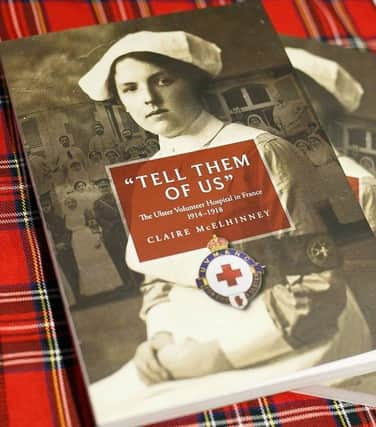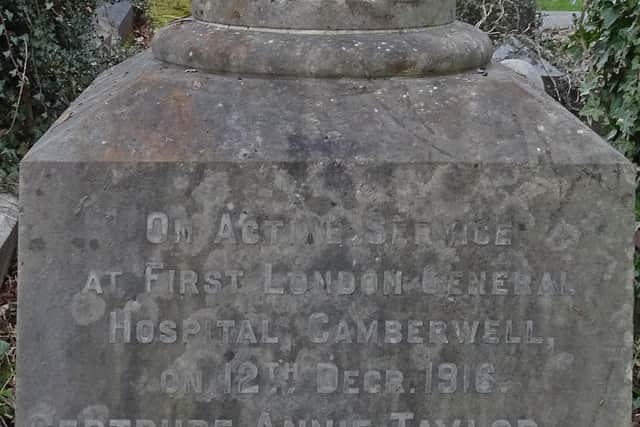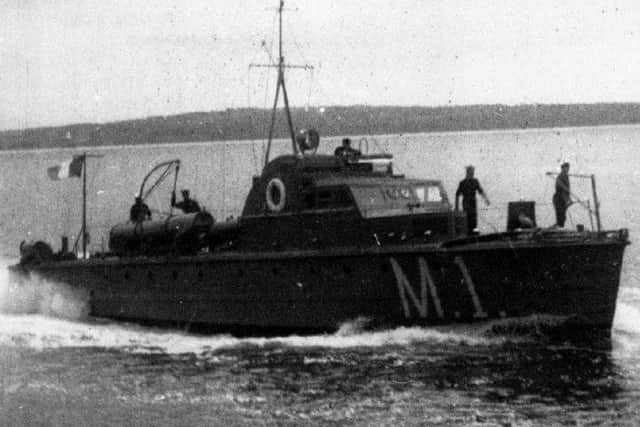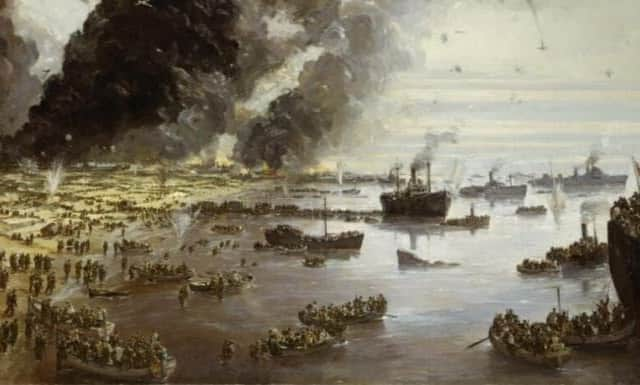Neutral Ireland’s navy participated in the historic Dunkirk evacuation


History Hub Ulster’s Nigel Henderson shared a tribute made at the funeral of 35-year-old Belfast nurse Gertrude Annie Taylor who served at home and in France prior to succumbing to pneumonia in a London military hospital in 1916.
Gertrude’s body was returned to Belfast for burial in the City Cemetery after a service in Belmont Presbyterian Church where the Reverend MacDermott preached a heartfelt sermon.
Advertisement
Hide AdAdvertisement
Hide Ad“Miss Taylor’s death reminds us that not all the heroes in the war were men,” said the clergyman “they were not all to be found among the fighters at the front…they faithfully performed their duties at the bedsides of the wounded and weary…but they were heroes and heroines all the same.”


Unusually for a woman, Gertrude’s gravestone was inscribed ‘Died in active service’.
Over a century later the Rev MacDermott’s words resonate just as powerfully for today’s heroic frontline workers battling against Covid-19.
Strabane-reader Beulah Dillon e-mailed Roamer “your recent articles about women in the First World War reminded me of the very interesting book on the subject called ‘Tell Them of Us’ written by an Omagh woman whose grandmother had served in France.”
Advertisement
Hide AdAdvertisement
Hide AdBeulah said that there’s more information about the book on the internet and included the author’s name, Claire McElhinney, “who tells the story of a courageous group of women who trained as part of the Ulster Volunteer Medical and Nursing Corps during the Third Home Rule crisis and volunteered for active service following the outbreak of war.”


I found a reference on the internet to Omagh Probus Club, where Claire McElhinney spoke about her book.
Her grandmother, Edith Harkness from Plumbridge, joined the Nursing Corps of the Ulster Volunteer Force in March 1914.
Formed in 1913, by the time war was declared in August 1914 the UVF Nursing Corps numbered some 5,000 persons.
Advertisement
Hide AdAdvertisement
Hide AdWhen the call went out for nurses to serve the war effort Edith volunteered to go to France and was posted to a French military hospital in Pau (near the Spanish Border) where her ability to understand French served her well.


In the early days of fighting wounded soldiers were transported 600 miles from the Western Front to Pau but as casualties mounted in 1916 the Ulster Volunteer Hospital moved to Lyons in order to be closer to the action.
Following the Battle of the Somme the British army began to evacuate its wounded back to England and put out an urgent call for nurses.
With her operational experience Edith was promptly recruited and spent the reminder of the war in a large military hospital
in Ripon in Yorkshire.
Advertisement
Hide AdAdvertisement
Hide AdOn her return to Plumbridge she married Walter McFarlane and together they reared a family of eight children, one of the girls being Claire McElhinney’s mother.
‘Tell Them of Us’ was launched by the Ulster-Scots Agency in 2018.
There’s more information about the book and photographs from the launch on the Agency’s Facebook page and their e-mail address is [email protected]
WWI was meant to be ‘the war to end all wars’, but the 80th anniversary of start of WWII’s Dunkirk Evacuation was marked here on Wednesday.
Advertisement
Hide AdAdvertisement
Hide AdRegarded by historians as one of several events in 1940 that determined the eventual outcome of the Second World War, the evacuation, known as Operation Dynamo, was described as a ‘miracle of deliverance’ by wartime Prime Minister Winston Churchill.
Around 350,000 soldiers were evacuated from Dunkirk between May 26 and June 3 1940 - six destroyers were sunk, along with eight personnel ships and around 200 small craft, from a total of around 860 vessels of all sizes that took part.
The Germans took over a million Allied prisoners in three weeks at a cost of 60,000 casualties but the operation was a major boost to British morale.
Some of us may not know that an Irish Motor Torpedo Boat (MTB) was part of the historic Dunkirk flotilla.
Advertisement
Hide AdAdvertisement
Hide AdIreland was neutral during WWII, but in his book ‘Spitting on A Soldier’s Grave’ author Robert Widders reveals how the Irish government purchased six Motor Torpedo Boats (MTBs) in 1939/40 from a British shipyard to protect Eire’s neutrality. Ireland had one vessel, The Muirchú, operated by the Department of Agriculture and Fisheries, and though it was fitted with a gun, the Irish government wanted extra sea defences.
Cork-born Dubliner Gerry O’Neill was part of the Irish Navy crew sent to Southampton to bring back the MTBs, just before the Dunkirk evacuation.
The boats were numbered M1 to M6 and the Irish Navy skipper of M2, who’d formerly served in the Royal Navy, decided to join the rescue fleet to Dunkirk.
“He asked us if we’d volunteer,” Gerry O’Neill recounted. “Which we did. We made two trips across the channel. We brought back mostly walking wounded. Those lads didn’t know who we were. I think they thought we were Free French (Forces) because we had ‘FF’ on our caps.”
Advertisement
Hide AdAdvertisement
Hide AdOne of the ancient names of Ireland was ‘Inishfáil’ (isle of destiny) and ‘FF’ standing for ‘Fianna Fáil’ on the crewmen’s Defence Force badges, signified the ‘Fianna’, or the army, of Ireland.
A message from the Editor:
Thank you for reading this story on our website. While I have your attention, I also have an important request to make of you.
In order for us to continue to provide high quality and trusted local news on this free-to-read site, I am asking you to also please purchase a copy of our newspaper whenever you are able to do so.
Our journalists are highly trained and our content is independently regulated by IPSO to some of the most rigorous standards in the world. But being your eyes and ears comes at a price. So we need your support more than ever to buy our newspapers during this crisis.
Advertisement
Hide AdAdvertisement
Hide AdWith the coronavirus lockdown having a major impact on many of our local valued advertisers - and consequently the advertising that we receive - we are more reliant than ever on you helping us to provide you with news and information by buying a copy of our newspaper when you can safely.
You can also enjoy unlimited access to the best news from across Northern Ireland and the UK by subscribing to newsletter.co.uk
With a digital subscription, you can read more than five articles, see fewer ads, enjoy faster load times, and get access to exclusive newsletters and content. Visit https://www.newsletter.co.uk/subscriptions now to sign up.
Thank you